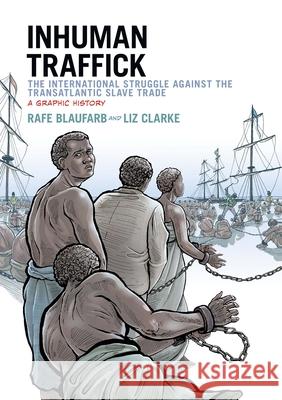Inhuman Traffick: The International Struggle Against the Transatlantic Slave Trade: A Graphic History » książka
Inhuman Traffick: The International Struggle Against the Transatlantic Slave Trade: A Graphic History
ISBN-13: 9780199334070 / Angielski / Miękka / 2014 / 240 str.
Inhuman Traffick: The International Struggle Against the Transatlantic Slave Trade: A Graphic History
ISBN-13: 9780199334070 / Angielski / Miękka / 2014 / 240 str.
(netto: 219,44 VAT: 5%)
Najniższa cena z 30 dni: 211,01
ok. 16-18 dni roboczych.
Darmowa dostawa!
Inhuman Traffick tells for the first time a story of enslavement and freedom that spans the entire Atlantic world. Beginning in 1829 off the west coast of Africa with the recapture of the slave ship Neirsee--previously seized by the British Navy in its efforts to suppress the "inhuman traffick"--and ending with the liberation of the African passengers who had been sold into slavery in the French Caribbean, Rafe Blaufarb puts a human face on the history of the transatlantic slave trade and the efforts to suppress it. He addresses a neglected aspect of this tragic history in the wide geographical and thematic contexts in which it took place--Africa, the Caribbean, Europe, and the Atlantic Ocean--and situates the story in familial, social, economic, diplomatic, and military spheres. Inhuman Traffick shows how history is done by explaining how the documents on which it is based moved through time and space from the ships, African outposts, colonial buildings, and ministerial offices to the archives of present-day Britain and France.
Blaufarb follows the ship, its crew, and its captives from the slave port of Old Calabar to the Caribbean and into the courts of Britain and France, where the history of the illegal slave trade, slavery in the Caribbean, and diplomatic history all come into focus. Students will be taken in by the vivid drawings and the rich narrative, but in Blaufarb's skilled hands, they will also find themselves immersed in a unique learning experience. Blaufarb not only presents the history of the ship and its captives, he takes the reader inside the project itself. He explains how he came upon the story, how he and his editor envisioned the project, and how he worked with illustrator Liz Clarke to craft more than 300 "cells" that comprise Part II of the book. He and Clarke even take the reader inside archives in France and Britain. This powerful combination of historical essay, graphics, primary-source documents, and discussion questions gives students insight into the Atlantic World plantation complex, the transatlantic slave trade, and the process of historical storytelling itself.










